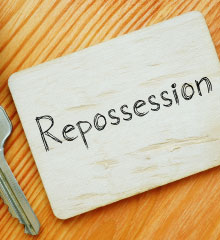Updated on January 12, 2024
California Foreclosure Process Timeline
In California, home loans are usually secured by a legal document called a “deed of trust” that permits the lender to reclaim the property if the borrower defaults on the loan. This means if a homeowner falls behind on their mortgage payments, lenders can take possession of their property and sell it through a process known as foreclosure.
If you’ve fallen into financial hardship and cannot afford your monthly mortgage payment, the best way to keep a roof over your head is often to file for bankruptcy. Filing for Chapter 7 or Chapter 13 bankruptcy will allow you to keep your home while getting a fresh financial start.
However, while the timeline for foreclosing on a house can vary, so you need to act quickly to protect your rights.
How Long Does It Take To Foreclose on a Property in California?
Under California laws, lenders can pursue a foreclosure case through the courts, but they almost always use non-judicial foreclosure instead. The non-judicial process can be completed in approximately 120 days (4 months). However, the timeline can sometimes be 200 days or more. There are several steps in the process that must be completed, each involving a waiting period before a lender can take action.
What Is the Whole Foreclosure Process?
The California foreclosure timeline officially begins when the bank records a Notice of Default in the county where the property is located. The lender must also send the borrower a copy of the notice by certified mail within 10 business days. After the Notice of Default is filed, the homeowner has 90 days to cure the default, which usually means paying everything that is owed.
If the borrower does not pay within the 90-day timeline, the bank can record a Notice of Sale announcing that the property will be sold at auction. The notice must also be sent to the homeowner by certified mail, be published in a local newspaper for three consecutive weeks before the sale date, and be posted at the property and a public place like the local courthouse.
At least 21 days after the Notice of Sale is recorded, the lender can sell the home at auction to the highest bidder. The winning bidder is then considered the owner of the house. If the sale price is less than the amount owed on the mortgage, the bank can pursue a “deficiency judgment” against the borrower to hold them responsible for the remaining balance.
How Does Pre-Foreclosure Work in California and How Long Does Foreclosure Take?
Before the formal foreclosure process timeline begins, they must take specific steps in what is known as the “pre-foreclosure” stage of the timeline. California law requires lenders to contact anyone on the mortgage loan to conduct a foreclosure avoidance assessment and explore alternatives to foreclosing on the home. The bank cannot initiate the official process until at least 30 days after this assessment.
What Can You Do and What Happens in a Foreclosure?
If the bank is in the process of foreclosing on your home, California law allows you to reinstate the loan by curing the default up until 5 days before the sale. You can also "redeem" the property by paying off the entire loan before the sale. However, if you can’t afford to stay current on your mortgage, you probably can’t stop the foreclosure timeline this way.
However, you can stop the sale by filing for bankruptcy. Once you submit your bankruptcy petition, you’ll receive an automatic stay that will stop the process in its tracks. As long as the automatic stay remains in place, the lender won’t be able to sell your home.
It's important to note that foreclosure can have a significant impact on a homeowner's credit score, making it difficult to secure new lines of credit in the future. Additionally, if the home is sold at auction for less than what is owed on the mortgage, the borrower may be held responsible for the remaining balance. To avoid these negative consequences, it is crucial for homeowners to take action as soon as they begin to experience financial hardship, whether that means exploring alternatives to foreclosure or filing for bankruptcy.
Understanding California's Foreclosure Mediation Program
California has a foreclosure mediation program that aims to help struggling homeowners and lenders explore alternatives to foreclosure. This program, known as the California Homeowner Bill of Rights (HBOR), was signed into law in 2012 and offers additional protections for homeowners facing foreclosure.
How Does the Foreclosure Mediation Program Work?
Under the HBOR, lenders must offer a single point of contact for homeowners facing foreclosure, ensuring clear and consistent communication. The law also prohibits "dual tracking," which occurs when a lender continues with foreclosure proceedings while simultaneously evaluating a homeowner's application for a loan modification or other foreclosure alternatives.
If a homeowner requests a loan modification or other foreclosure alternative, the lender must review the request and provide a written response before moving forward with the foreclosure process. This provision ensures that homeowners have the opportunity to explore all available options before losing their homes.
Benefits of Participating in California's Foreclosure Mediation Program
Participating in the foreclosure mediation program can provide homeowners with several benefits, including:
A chance to negotiate a loan modification, which may lower monthly payments or extend the loan term
An opportunity to explore other foreclosure alternatives, such as a short sale or deed in lieu of foreclosure
Increased communication with the lender, allowing for a better understanding of available options and the foreclosure process
Protection against dual tracking, ensuring that lenders cannot proceed with foreclosure while evaluating a homeowner's request for an alternative
What are the Consequences of Foreclosure in California?
Foreclosure in California can have several legal, financial, and personal consequences for homeowners. The most immediate consequence of foreclosure is the loss of your home. Once the foreclosure process is completed, you'll have to vacate the property, and ownership will transfer to the lender or the entity that purchased the property at a foreclosure auction. If you haven't vacated the property, the new owner can initiate eviction proceedings to remove you from the premises.
It’s also important to note that in California, depending on the type of mortgage and foreclosure process, lenders may be able to seek a deficiency judgment if the sale of the foreclosed property doesn't cover the outstanding mortgage balance and other fees.
Foreclosure also significantly impacts your credit score. A foreclosure remains on your record for several years and can make it challenging to rent a new home or secure a mortgage in the future. Landlords and lenders often consider a person's foreclosure history when making decisions about tenancy or loan approval. It can also make it challenging to qualify for new loans or credit cards and potentially leading to higher interest rates on future credit.
Furthermore, the forgiven debt resulting from foreclosure might be considered taxable income by the IRS. However, there are certain exemptions or relief options available, such as the Mortgage Forgiveness Debt Relief Act, which can exclude forgiven debt from taxable income.
Last but not least, foreclosure can have significant emotional and personal impacts on individuals and families, including stress, uncertainty about the future, and the loss of a cherished home.
If you're facing foreclosure in California, it is crucial to seek advice and assistance as soon as possible. Contacting an foreclosure lawyer can provide guidance on potential options that may be available to help mitigate the situation.
Seeking Legal Help During the Foreclosure Process
Whether you're in the pre-foreclosure stage or facing imminent foreclosure, it's essential to seek legal help from an experienced foreclosure attorney. They can help you navigate California's foreclosure laws, advise you on your rights under the HBOR, and assist with negotiating loan modifications or exploring other alternatives to foreclosure.
Don't wait until it's too late to save your home. Contact a foreclosure attorney today to discuss your options and develop a plan to protect your rights and financial future. Remember that knowledge is power, and understanding California's foreclosure process timeline and available resources can make a significant difference in your ability to keep your home and get back on track financially.


